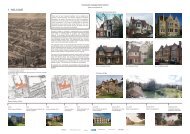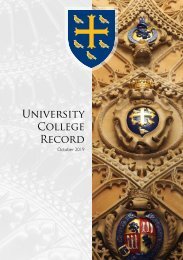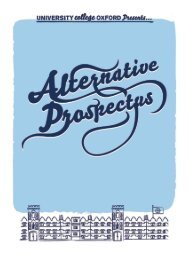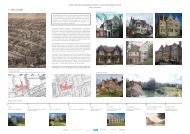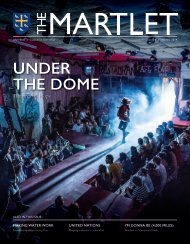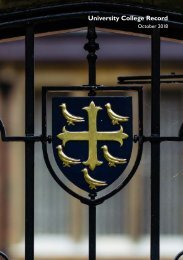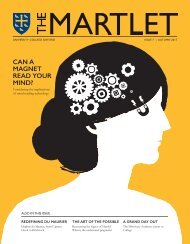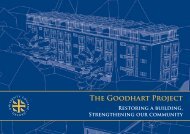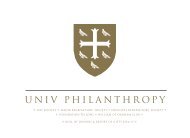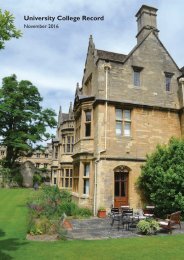Create successful ePaper yourself
Turn your PDF publications into a flip-book with our unique Google optimized e-Paper software.
1965<br />
JOHN RAINES-SMITH (Bishop Vesey’s Grammar School) died on 4 December 2015<br />
aged 80. John read Modern Languages at <strong>Univ</strong>, before taking up a career in business. He<br />
first worked as a Technical Sales representative with Fibreglass, Ltd., and later became<br />
Managing Director of UKAE Ltd., based in Birmingham.<br />
GRAHAM MAYRHOFER (Kent Street High School and the <strong>Univ</strong>ersity of Western Australia)<br />
died suddenly when on holiday in Turkey on 9 October 2016 aged 72. He came up to <strong>Univ</strong> to<br />
read Physiology, and then stayed on to do a D. Phil. here. This photograph has been supplied<br />
by the <strong>Univ</strong>ersity of Adelaide. Graham’s former colleague, Professor Gary Hoffman, has<br />
kindly provided this obituary:<br />
Graham was born in a remote rural town where his father was a primary school<br />
principal, a post which entailed many rural postings before being promoted to coveted<br />
senior city postings. The family was of Bavarian origin, but had moved to Naples before<br />
migrating to Australia in the 1880s. Three of his uncles were medical practitioners.<br />
Graham completed three years of medical studies at the<br />
<strong>Univ</strong>ersity of Western Australia before winning a <strong>Univ</strong>ersity<br />
of Oxford Commonwealth Medical Scholarship in 1965.<br />
He completed Honours Schools Animal Physiology before<br />
undertaking D.Phil. studies with Professor Henry Harris,<br />
FRS, followed by clinical training and house jobs in<br />
Oxford. Along the way he won the Prizes in General and<br />
Special Pathology.<br />
Rather than practising, Graham then embarked on a<br />
life-long research career which included a return to the Sir<br />
William Dunn School, where he worked with Professor<br />
James Gowans, a leader in British immunology. This was<br />
followed by a research post at the Children’s Hospital<br />
Research Centre in Perth and finally appointment to the <strong>Univ</strong>ersity of Adelaide where he<br />
was a teacher, researcher and administrator for 32 years. His research was concerned with<br />
immunology, primarily how the intestinal tract, one of the body’s portals to the outside<br />
world, protects itself from attack by foreign substances and organisms, especially parasites.<br />
He also collaborated widely, and published over 70 scientific papers. His work was<br />
characteristically elegant, careful and significant. He continued to teach after retirement.<br />
The high esteem in which he was held by a wide range of colleagues, evident in the many<br />
contributions to the eulogy at his funeral, was based on his modest, gentle and generous<br />
personality combined with a rigorously logical intelligence.<br />
In addition to his science, Graham was a dedicated runner, a gardener with a profound<br />
interest in, and knowledge of, native Australian plants, and also a devoted family man.<br />
He is survived by his widow, Adele, their two children Sarah and Michael, as well as<br />
children, Marshall and Tamsin, from a previous marriage. He is sadly missed by many,<br />
including his surviving sister, Maxine.<br />
82<br />
1966<br />
RICHARD JAMES MCKANE (Marlborough) died on 17 September 2016 aged 68. He<br />
read Modern Languages at <strong>Univ</strong>. We include here a shortened version of a tribute by his<br />
friend Ksenia Afonina, which she has kindly allowed us to<br />
use:<br />
Richard McKane was born on 31 October 1947 in<br />
Melbourne, Australia. From early childhood he was exposed<br />
to different cultures and languages. He became fluent in<br />
French as a young boy and he travelled extensively across<br />
the Middle East, and spent several years in Turkey, where he<br />
became proficient in Turkish. He could read Greek, Persian,<br />
Uzbek, Hungarian, but of all, Russian became his greatest<br />
passion.<br />
Richard first started learning Russian at the age of<br />
thirteen, and then went on to read it at Oxford. Since he<br />
was not able to travel freely to the Soviet Union during the<br />
Cold War, his ultimate Russian companion was Prince Dmitri Obolensky’s Penguin Book<br />
of Russian Verse. During his last year at Oxford, Richard completed his first translation<br />
of Anna Akhmatova Selected Poems, which was published soon after his graduation.<br />
Unfortunately, that year was also marked by Richard’s first ‘catastrophic breakdown’, as<br />
he described it. He was diagnosed with bipolar disorder, which he bravely managed with<br />
miraculous strength and exceptional humour.<br />
In 1978, Richard was awarded the Hoddar Fellowship in the Humanities at<br />
Princeton <strong>Univ</strong>ersity and moved to the US, where he met Joseph Brodsky, and his future<br />
wife Elizabeth. They were married a year later in Oxford and worked together on Osip<br />
Mandelstam’s Moscow Notebooks (1990). In 1979, their daughter Juliet was born, and soon<br />
after Richard returned to England. In 1989, to mark Akhmatova’s 100th anniversary, his<br />
extended volume of her poems was published. Peter Levi noted:<br />
‘McKane’s Akhmatova versions are unparalleled, and a great advance on his<br />
admittedly brilliant early work on that wonderful poet. They have a restrained brilliance<br />
and an extraordinary personal power’.<br />
That year Richard travelled to the Soviet Union for the first time. He had many<br />
friends in Russia, especially in literary circles. His favourite Russian poet was Leonid<br />
Aronzon, and Richard dedicated several years of his life opening up Leonid’s world to<br />
the English public.<br />
Richard McKane translated Osip Mandelsham and many other poets, but also wrote<br />
poetry himself from when he was in college until his last days. Once a squash school<br />
champion and golf player, he was confined to a wheelchair after a severe injury, but he<br />
never gave up his love and passion for poetry, people and justice.<br />
For over eighteen years, he worked as an interpreter from, and into, Turkish and<br />
Russian at the Medical Foundation for the Care of Victims of Torture. He acted as<br />
co-chair at The Pushkin Club in London for twenty years. After retirement from his<br />
translating career, he continued writing and reciting poetry.<br />
Richard loved the world, its people, its beauty and tried his best in his own way to<br />
make it a better and happier place for us all.<br />
83




